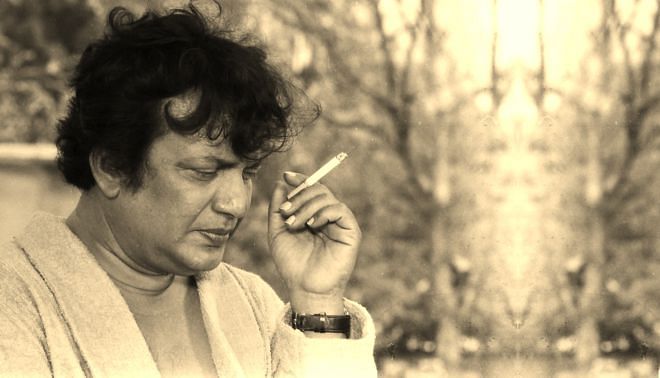The passion of Uttam Kumar
The passion of Uttam Kumar

Uttam Kumar continues to exude the aura that defined him when he was alive. Thirty four years after his passing, there are the memories that speak of the man. He was part of our fathers' generation before becoming part of ours. It was his movies that our parents went to, especially if he was paired with Suchitra Sen. They went to see him not merely because they wished to judge his acting --- he was, for that generation, above judging anyway --- but also and more decidedly to experience the romance he personified in his on-screen relationship with Suchitra. And then, of course, there were the songs which, sung by Hemanta Mukherjee, quickly became Uttam's. Only days before he died, Hemanta spoke of the vacuity he went through when Uttam's life came to an end. 'When Uttam died, a huge chunk of me died with him', said the artiste.
You could pick up from there, broaden the thought, and suggest that Uttam's death was the end of a dream. He had not been ailing, he had not grown into the infirmities that age brings. It was his heart that stopped beating on a July day in 1980. The Mahanayak ended his life in the sort of blaze with which he had stormed his way into the hearts of his fans. And there were millions of them. Shooting stars are a rare sight and yet Uttam's run in life was the rise and fall of a shooting star. The light simply and quickly went out. And yet it was Uttam, the light in him, which for years made a generation of moviegoers, indeed an entire bhadralok class on both sides of a politically divided Bengal, endlessly aware of the romantic that epitomized the Bengali young man.
In Uttam, the sparks of romantic love never quite died out. He was every woman's dream. If Suchitra gave him reason to feel that his star quality was no reason for him to be nonchalant about shooting schedules (early on she made it clear that he could not keep people waiting for him to appear before shooting could begin), there were others who craved roles beside him. One of them, Supriya Devi, did better: she made his way into his heart, lived with him, in effect told the world she and he belonged. There was Sharmila Tagore, who blended well with Uttam. But no romance for Uttam was higher or more profound than the chemistry he shared with Suchitra. Supriya Devi, she who shared her life with Uttam for seventeen years, attests to the closeness which underlay the Uttam-Suchitra relationship. Maitreyee B. Chowdhury puts it on the record: “Passionate romance or teasing humour, Suchitra is believed to have pulled Supriya's leg on many such occasions. Once, when Suchitra called up to speak to Uttam, on being informed that he had stepped out, she mischievously added, 'What a pity. I felt like kissing him.'”
You do not argue about Uttam being the epitome of romance. He was a dashing on-screen lover who could sing his way into the hearts of his women and his audience. Pause awhile, now, to ask if Uttam Kumar was a great actor, at once ready and equipped to play roles that went beyond those he portrayed in his movies. You need to reflect on why Satyajit Ray went looking for Soumitra Chatterjee when he needed a character for his movies (Uttam appeared in only two Ray movies, while Soumitra was chosen for fourteen). In movies like Charulata, Soumitra convinced the audience of the depths in him, of the versatility which informed his abilities. There is little question that in terms of intellectual substance, Soumitra was the bigger actor. Much the same can be said about Chhobi Biswas and Pahari Sanyal. All three men were intense in the range of the roles they played. Uttam suffered on that score. He was, if you think about it, in a way imprisoned by the stereotype his roles had turned him into. But there was no hint that he ever suffered inwardly for it. That he was a heartthrob was all.
If women swooned before Uttam or were willing to be in his arms, there were the men who imitated him in all his mannerisms and style. And not just ordinary men. If you travel back to the 1960s, you will bump into actors who clearly and secretly tried moulding themselves on the Uttam persona --- all the way from the manner in which he wore his hair to how he walked to how he addressed his on-screen lovers.
Uttam Kumar's smile was infectious, tinged as it was with a dash of mischief. He filled the room with his presence. He was not part of the Coffee House crowd, as Soumitra was. College Street was not a place he fancied. As Swapan Mullick tells it, “He was too much the family man, who loved his pujas at home, and too much the bhadralok.” He hummed Tagore's akash bhora shurjo tara and mone robe ki na robe amare.
Uttam Kumar is the virile, passionate man all Bengali men
have dreamed of being. That is how we celebrate him.
(Uttam Kumar passed away on 24 July 1980.)